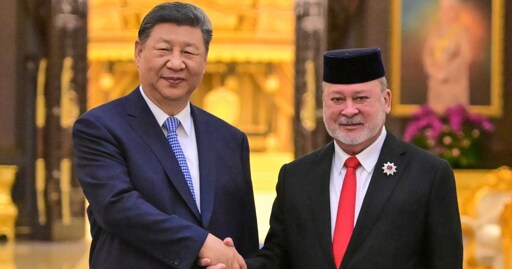- cross-posted to:
- world@lemmy.world
- cross-posted to:
- world@lemmy.world
China’s President Xi Jinping has arrived in Malaysia as part of a Southeast Asian tour which is seen as delivering a personal message that Beijing is a more reliable trading partner than the United States amid a bruising trade war with Washington.
Xi’s three-country tour and his “message” that Beijing is Southeast Asia’s better friend than the truculent administration of US President Donald Trump comes as many countries in the 10-member Association of Southeast Asian Nations (ASEAN) bloc are unhappy with their treatment after the US imposed huge tariffs on countries around the world.
“This is a very significant visit. You can read many things into it,” said Mohamed Nazri Abdul Aziz, a former Malaysian ambassador to the US and minister of legal affairs.
“Under PM Anwar, Malaysia is getting very much closer [to China]. It’s a good thing,” he added, noting that “in the long run”, Washington’s “influence will be reduced”.
Washington hit Malaysia with a 24 percent trade tariff, accusing it of imposing a 47 percent tariff on US imports, a rate that Malaysian officials rejected.
Xi’s visit to Malaysia is in part an effort to “reinforce” the view that China can “offer to bypass America”, said James Chin, professor of Asian studies at the University of Tasmania in Australia, via a different international order such as BRICS – the 10-country intergovernmental organisation comprising Brazil, Russia, India and China, among others.
“Basically, this is all architectured to build a new international order… Trump has given China the excuse to push harder amongst countries around the world, especially developing countries,” Chin said.
Of the three countries Xi chose to visit this week, analysts said Malaysia is deemed to be the most important for China, given its sizeable 32 million population, its developing high-tech base and its current chairmanship of ASEAN. China is also Malaysia’s largest trading partner since 2009, and in 2024, China-Malaysia trade reached $212bn.
“China hopes to jack up trade with Malaysia, which will make up for the expected downgrading of exports to the US,” said Willy Wo-Lap Lam, a senior China analyst with the US-based Jamestown Foundation and author of the book, From Confucius to Xi Jinping.
“Politically, Malaysia has a lot of influence among all 10 ASEAN states,” Lam said. “Including how countries that have territorial disputes with China in the South China Sea should respond to Beijing’s aggressive tactics in bolstering its hold over.”



Communism doesn’t get rid of property ownership. Communal ownership is still property ownership, including the right to sell/rent to private/outside interests.
The right framework for judging an econo-governance is the level of oligarchy, capital, corporate supremacy/power maximalism in the rulership/policies. Corporate/Capital vs Labour power is a primary political axis, but fights among supremacist forces makes democracy automatically corrupt.
UBI/freedom dividends provides a market based power equality between capital and labour, and always ultimate solution. But countries that are able to control oligarchist/CIA excess will continue to do better than those who can’t. We/our media labels them authoritarian for resisting evil.
Communal ownership implies that there is a democratic ownership, which is not the case in china
You keep making that unbacked assertion despite evidence to the contrary. This is erring on chauvanism at this point, it seems like you have more of an emotional attachment to refusing to recognize the PRC as democratic than a logical one. Why is that?
I mentioned UBI/Freedom dividends. The right/obviousness of that is that all citizens have an equal share in nations revenue/taxes. No nation is at that level of freedom yet. The next best thing is not corrupting nation’s resources for oligarchist/corruption power maximalism, and governing for shared prosperity. Corporations also often have a management bias in arguing that investing in growth is better than a dividend. While they can be right, even in hindsight, and so the mildest corruption, it is always less corrupt to pay dividend, and let the shareholders reinvest that dividend if they want for greater promised returns from the corporation.
China does a fair job in distributing investment across regions, with overweight on its less developed provinces. It doesn’t meet my perfection ideal. Corrupt supporters of US empire cannot justifiably criticize it as worse than their clear corruption.